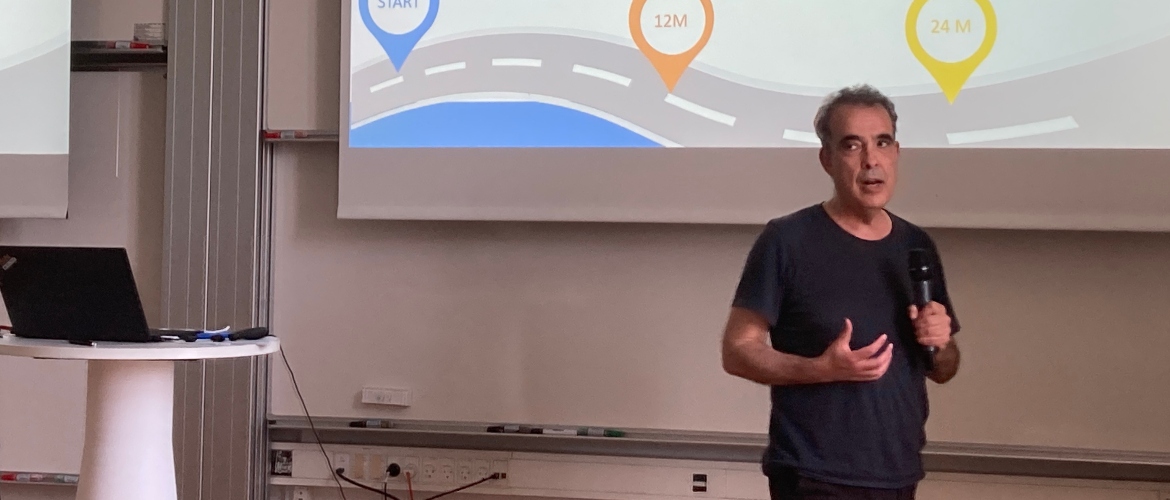The coordinator of HAPPY PATIENT, Dr. Carl Llor, researcher at IDIAP Jordi Gol and family doctor, explains in this interview his role in the project and everything that working on it for three years alongside professionals from around Europe has brought to him.
HAPPY PATIENT emerges as a standout initiative in the European context addressing inappropriate antibiotic prescribing. What sets it apart from other comparable projects? What do you consider its most distinctive feature compared to other similar projects?
The project’s foremost and ambitious aspect lies in its incorporation of four diverse healthcare settings. While this methodology had been employed in general practice and out-of-hours services before, there was some prior experience in nursing homes, but its application in community pharmacies was unprecedented. The project’s distinctive feature is the inclusion of four distinct healthcare settings and the consistent application of the intervention across them, distinguishing it from other initiatives.
What was your main motivation for getting involved in a project of this magnitude and complexity?
We came across a call from the European Commission and saw it as an excellent opportunity to propose a project that builds upon our previous project, HAPPY AUDIT. HAPPY PATIENT extends the scope, encompassing additional settings and aligning with the EU Guidelines on the prudent use of antimicrobials in human health. We deliberately included countries with high antibiotic consumption rates in Europe as part of the project.
On a personal level, I was keen to lead a European project, especially one of this nature, with dedicated partners who had collaborated on previous initiatives.
How would you describe the personal contribution you have made to the HAPPY PATIENT project and what it has brought you on a professional and personal level?
I prefer not to focus on individual contributions but rather view them as collaborative efforts within the team. In this regard, I think that we have managed to consolidate a strong coordination team (Ana Garcia, Daniela Modena, Stella Mally, Anders Bjerrum, and myself). Our mission revolves around meeting European requirements and providing support to partners facing uncertainties or heavy workloads. It’s worth noting that achieving this goal has been relatively straightforward within this consortium, given the diligent and constructive efforts of all partners. Additionally, the overall atmosphere within the consortium has been exceptional.
From a professional point of view, coordinating a project with such distinctive features is consistently enriching and rewarding. Beyond that, contributing to the effort to combat antimicrobial resistance through a straightforward methodology capable of influencing healthcare professionals’ behaviour has been exceptionally gratifying.
On a personal level, words fall short. I’ve had the opportunity to collaborate with individuals I’ve worked alongside for many years, reconnect with those I haven’t seen in a while, and forge connections with new professionals. All of this has strengthened the consortium, encouraging us to carry out other projects such as IMAGINE, and I’m confident that more endeavours are on the horizon.
The project addresses inappropriate antibiotic prescribing at the European level. How have you tackled the specific challenges associated with the diversity of medical practices and healthcare systems in different European countries?
Incorporating countries with diverse healthcare systems, varying backgrounds, distinct antibiotic usage patterns, and differing antimicrobial resistance rates is a key strength of the project. This diversity enables us to disseminate the study results effectively across a spectrum of countries, a crucial aspect in the context of a European project.
The project has been meticulously managed with a robust secretariat. Collaboration and mutual respect have been the focal points of our coordination efforts, contributing significantly to the success of HAPPY PATIENT. Our approach has been highly accommodating, with a commitment to listening to all partners, fostering a sense of belonging and comfort within the project. From the project’s inception, my priority was to establish a formidable and efficient secretariat, and I’m pleased to say that we have successfully accomplished that goal.
What have been the biggest challenges in coordinating a team of qualified professionals distributed across different European countries, and how have you overcome them?
One of the challenges we have encountered was the slow recruitment pace in some sectors and in some countries. However, I consider that the fact that the coordinating team has fallen on one of the participating countries is otherwise a strength of the project as this has fostered a deeper understanding of the challenges faced by other nations.
Moreover, the impact of COVID-19 cannot be overlooked, as it led to a reduction in the research capacity of many professionals. Fortunately, the project’s simplicity in terms of the registry proved advantageous in mitigating this impact. Nevertheless, the project’s initiation coincided with the height of the pandemic, causing a delay in our start date. Additional challenges, such as streptococcal infection epidemics and shortages of first-line antibiotics, particularly affecting Poland and Lithuania, were also encountered. Another challenge has been that some interventions have been conducted online. Despite these challenges, our adaptability and resilience have played a pivotal role in navigating and overcoming these obstacles.





